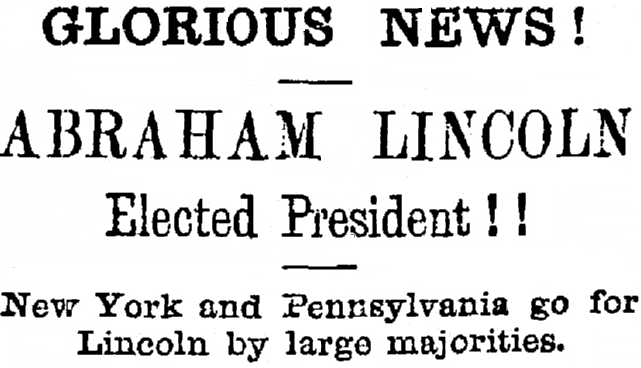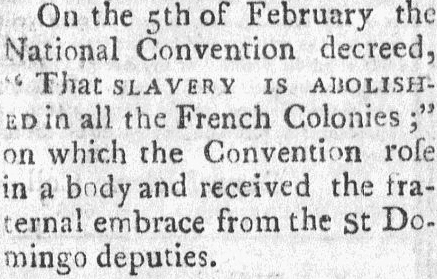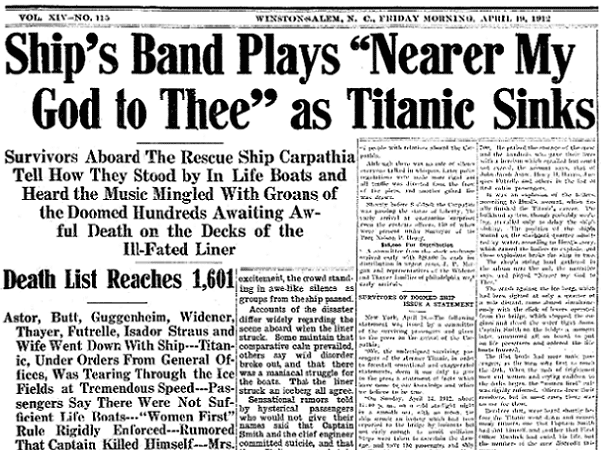Introduction: In this article, Mary Harrell-Sesniak shows how searching for headlines in old newspapers turns up articles that provide a glimpse into our ancestors’ world and their daily lives. Mary is a genealogist, author and editor with a strong technology background.
From iconic happenings of the past to lesser-known events, reading old newspaper headlines helps us share the day-to-day experiences of our ancestors. Reading the news that they read is one way to walk in their footsteps.
For example, imagine being in Vermont on 8 November 1860, picking up your local paper, and seeing this newspaper headline announcing Abraham Lincoln as the new president.

So why not become a newspaper headline hunter and query GenealogyBank’s Historical Newspaper Archives to see what was happening in your ancestors’ lives? Knowing the events that were happening that affected their lives, and the news that they were talking about with their family and friends, helps provide a glimpse into their world and into the past.
Abolishing Slavery
Headline hunters weave fascinating circumstances into life stories. They’re constantly on the search for a bold or unusual newspaper headline that leads to something interesting.
In their search for headlines, they select major historical events, along with what was happening in the outside world during particular time periods. Sometimes they’ll stumble on a major event they never heard of, leaving one to wonder why it is not included more in history books.
For example, manumission (the freeing of slaves) occurred in many parts of the world long before the 13th Amendment to the United States Constitution (adopted 6 December 1865) abolished slavery in the U.S.—and the movement continued long after.
For example, a search on the terms “slavery abolished” pulled up this 1794 newspaper article about the French Colonies.

That search also found this 1879 article about African King Mtesa (or Mutesa) of the Kingdom of Buganda abolishing slavery throughout his dominions.
Women’s Suffrage
Another movement not fully addressed in history books is women’s suffrage, underscoring the importance of newspaper research to clarify historical events.
A search on the term “suffragettes” found this old newspaper headline.
This headline reports that women were humiliated, harassed and often treated as criminal offenders. Imagine how a young girl of today would feel if she learned that her great grandmother was jailed, merely for wanting to vote!
These two headlines introduce articles reporting that California granted females the right to vote in 1911, but the quest for national equality took until 26 August 1920, when the 19th Amendment to the U.S. Constitution was adopted.
For an interesting timeline of how the women’s suffrage movement progressed, see the National Women’s History Museum’s Woman Suffrage Timeline (1840-1920).
Timely Timelines
You can locate many interesting timelines in newspapers, either as feature articles or related to historical events. Search for them using the keywords “timeline,” “this day in history” or “famous headlines.”
You may wish to construct your own timeline with historical newspaper headlines. Pick a subject and locate pertinent newspaper headlines and their corresponding articles. Categories are only limited by your imagination.
- Art & Artists
- Civil Rights
- Disasters (Hindenburg, Titanic, volcanoes, etc.)
- Famous People (explorers, presidents & first ladies, the rich & famous, etc.)
- Laws (age of majority, child labor, education, immigration, manumission & slavery, suffrage, etc.)
- Entertainment (movies, music, plays, etc.)
- Eras (Roaring Twenties, Victorian Age, etc.)
- Genealogy Research (Alex Haley’s Roots, lineage societies, technological advances, etc.)
- Great Discoveries (gold, medical advances, vaccines, etc.)
- Migrations (immigration, westward expansion)
- Sports & Events (competitions, Olympics, World Series, world fairs, etc.)
- States, Territories & County Formations
- Wars & Military Events
Here’s a timeline of important events that the Charlotte Observer published in 1907.
Your genealogy software may have overlays or add-ons to create a timeline, or you can make one in a spreadsheet or with one of the free tools found on the Web. Many timeline “how-to” articles are written for teachers, but the concept applies equally to family historians.
Here are two helpful timeline articles:
- 8 EXCELLENT FREE TIMELINE CREATION TOOLS FOR TEACHERS from Educational Technology and Mobile Learning
- TOP 10 FREE Timeline Creation Tools for Teachers from Christopher Pappas
Before & After Headlines
An effective tool for teaching family history is to compare before and after newspaper headlines.
For example, here is a newspaper ad from the steamer company White Star Line, advertising cross-Atlantic voyages on its huge new ship Titanic (misspelled as “Titantic”), just two months before the steamer’s ill-fated maiden voyage.
By contrast, here is one of the many shocking headlines the world saw after the “unsinkable” Titanic hit an iceberg and sank in the early morning hours of 15 April 1912.
Here is another jarring example of contrasting old newspaper headlines. The first is a straightforward headline about the “famous dirigible navigator” Dr. Hugo Eckener arriving in America for a series of conferences on expanding dirigible service between Europe and the U.S. Eckener announced that the Hindenburg dirigible would soon resume its transatlantic flights, and declared:
By the end of the summer, I am certain we will have convinced anyone who has any doubts about the safety of Zeppelin flights across the Atlantic.
Less than four months after Eckener made his remark, the world saw headlines such as this in its newspapers.
Please share with us any of your favorite or surprising historical newspaper headlines found at GenealogyBank!
Related Articles about Newspaper Research for Family History:
